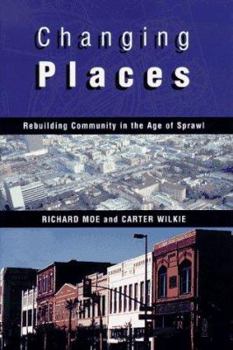Changing Places
Select Format
Select Condition 
Book Overview
America's preservation movement has long fought the destructive force of so- called urban renewal, where highways and shopping malls rise up on the rubble of former thriving downtowns. Now communities... This description may be from another edition of this product.
Format:Hardcover
Language:English
ISBN:0805043683
ISBN13:9780805043686
Release Date:January 1997
Publisher:Henry Holt & Company
Length:288 Pages
Weight:0.05 lbs.
Dimensions:1.0" x 6.4" x 9.6"
Customer Reviews
3 ratings
What have we done to our cities?
Published by Thriftbooks.com User , 23 years ago
Moe and Wilkie describe what has gone wrong with the planning of urban and suburban America, and discuss their solution: a combination of historic preservation, community activism, and more intelligent zoning regulations. Their book is very much in the spirit of New Urbanism - that cities should be looking backward to traditional planning approaches that served us so well before World War II. Memphis gets the most attention in this book, as both a positive and negative example; the authors also focus on New Orleans, Pittsburgh, Denver, St. Paul, Portland (Ore.), and several small towns that revitalized their main streets. Moe and Wilkie write with a journalistic balance that I found refreshing, in contrast to the rabid ranting of certain other books. Even when describing Disney's failed effort to build a theme park in northern Virginia, the authors resist the trap of making Disney sound like the heart of evil, and allow the reader to understand the situation from Disney's perspective. The only drawback is that even though the book is about historic preservation and urban planning, there are only 20 illustrations.
A passionate, well-argued statement against urban sprawl.
Published by Thriftbooks.com User , 26 years ago
The authors offer a very articulate, well-documented argument that presses for a more preservation-oriented urban planning that respects the nation's architectural treasures. Of course, we have all heard this argument so many times before--- one that often falls on deaf ears because federal policy, urban political priorities, and powerful development interests work against it. With this hard reality in mind, the major contribution of this work is that the authors suggest that preservation is not only about saving historic architecture and historic places, it is also about restoring and rebuilding our nation's shattered urban communities. As they state it so well, "(p)reservation is the business of saving special places and the quality of life they support. It has to do with more than bricks, balustrades, columns, and cobblestones. It has to do with the way individuals, families, and communities come together in good environments" (p. 240). Beyond the planni! ! ng rhetoric, the authors provide a number of detailed case studies of New Orleans, Memphis, Pittsburg, and snapshots of other towns both big and small that illustrate well exactly how this connection between historic preservation and community can be made. With all of the current attention on "community" as the critical factor in restoring a hospitable environment in urban America, this book necessarily becomes very relevant and useful.This book is so well written and interesting! I do not hesitate to recommended it to all audiences.
An in-depth diagnosis of urban sprawl.
Published by Thriftbooks.com User , 26 years ago
Another book on urban sprawl can understandably be met with diminished expectations. But don't allow your expectations to languish when you pick up Changing Places. Get ready for the passion of two preservationists. And no one is exempt from their stern gaze; not the press, not the politicians, not the professional planners, not the building industry, and not even you and me. Richard Moe has been the president of the National Trust for Historic Preservation since 1992. His attention to detail conspires with his affinity for root causes in the aptly titled Changing Places. Carter Wilkie was a White House speech writer. Moe and Wilkie observe we have abandoned the art of place making. As we are products of our created settings, the disintegration of historic communities leaves us with a loss of identity as a people. We become historically illiterate. This book isn't for everyone. If you have never walked into a traditional urban setting and asked yourself: "How in the world did they ever let this happen?" then you'll find this book unsatisfying. If you've never wondered how to restore the historic, civic, cultural and economic center of a community, then you'll be mystified by the authors' flair for detail in successful plans for reclamation. If you've never sensed the hopelessness in the eyes of our children in urban settings, then you'll have little use for the authors' thoughtful choice of words in defining our loss. If, on the other hand, you perceive the loss and think there is still something worth preserving, something to salvage, then this is a must-read. John F. Rohe (rohe@freeway.net), the reviewer, is an attorney in Petoskey, Michigan and is the author of A Bicentennial Malthusian Essay (ISBN 1-890394-00-9).






